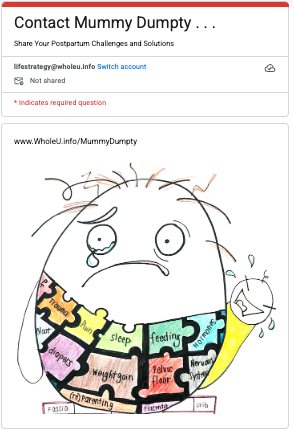Why Struggle for Life?

Preparing for Life
I became a mother in 2018, and was grossly underprepared. Not for lack of effort - but my preparation proved myopic. I had attended childbirth classes, watched videos, and read every line of “The Pregnancy Encyclopedia” - with most of my focus on my baby’s growth - but not my own.
My daughter London was born a week earlier than her due date. The empowered “birth plan” I envisioned was abruptly replaced by a whirlwind of unexpected occurrences:
- not having family with me
- receiving too much pain medication
- vomiting my dinner, and
- multiple shifts of hospital staff with charts, needles, and yawns.
I was shocked by the techniques that were used and offered to assist with my daughter’s birth - a 48 hour ordeal that I found to be ... traumatizing.
If I could go back in time, I would have made three significant changes that would've undoubtedly altered my entire experience, and the trajectory of the next several years...
- Before: Researched the history of childbirth practices and postures from other cultures
- During: Invested in hiring a doula or midwife to help me in the hospital.
- After: Found a way to insist on a proper “postnatal confinement” to recuperate my mind and body, and set myself and London up for success.
Instead, I rushed back into the stress of life - household responsibilities, a ridiculous number of dentist appointments, and keeping my business afloat. As a result, I felt chronically overwhelmed, and “running on empty” - exacerbated by a dire lack of sleep.
Physiological After-Effects of Birth
I’ve only recently become aware of the pervasiveness of “trauma.” In his sobering book The Body Keeps The Score, Dr. Bessel Van Der Kolk reveals that, “long after a traumatic experience is over, it may be reactivated at the slightest hint of danger and mobilize disturbed brain circuits and secrete massive amounts of stress hormones.”
That resonated. I found that childbirth sparked a cascade of long-term physiological effects. My ailments were multifactorial and prolonged:
- bloated body
- separated abdomen (diastasis)
- collapsed pelvic floor (plus cystocele and rectocele), and
- changes in cognitive functioning - sometimes referred to as “Mommy Brain”
- I was also consumed by sudden emotions, including sadness, resentment, and even rage.
Sound familiar? For you, your wife, sister, coworker, or neighbor? You’re not alone...

- Postpartumdepression.org reports that “nearly 50% of mothers with postpartum depression are not diagnosed by a health professional."
- According to extensive scientific research published in Mother and Birth Journal by Claudia Klier, MD, and her team, “Traumatic birth experiences need to be a central concern of the political health agenda of every nation.”
- The Biden administration acknowledged that pregnancy and childbirth can be “traumatic experiences.” Their 2022 “Blueprint for Addressing Maternal Health” outlines many of the factors that must change.
Healing (aka Managing Long-Term Effects of Traumatic Birth)
I don’t expect systems to change quickly, if at all. So I'm focusing on what I CAN control - i.e. prioritizing self care.
(No, not the occasional pedicure!)
I'm referring to deep healing on multiple levels - physical, emotional, mental, and spiritual. I continue to research, practice, and improve upon various ways to foster health. From my personal experience, 10 things that have been helpful in my postpartum healing journey are to . . .
- REST! (meditate, lay in a sauna .... surrender to the nap.)
- Practice compassionate self-care rituals (e.g. drinking nourishing broth, and soaking in an epsom salt bath.)
- Express, draw or write your feelings (Drawing this character - “Mummy Dumpty” helped me acknowledge the brokenness I felt, and thereby helping me to feel "seen" - if only by myself ;)
- Don’t suffer in silence. You are the only person who truly knows how you are feeling, and it may require vulnerability to ask others for help. Find a listener who validates what’s happening with you.
- Create a support system of childcare providers so that you can take breaks.
- Reconnect with things that bring you joy - (new recipes, dance classes, good books)
- Find complementary medicine approaches to supplement traditional healthcare (e.g. pelvic floor therapy, massage, chiropractic care)
- Find therapy that works for you (I increased my “somatic healing,” stretching, and recently started neurobiofeedback)
- Join a like-minded community that prioritizes healthy activities
- Tap into your resilience, and know that significant transformation can grow from traumatic experiences
We are not “broken” beyond repair.
We can put the pieces back together.
We can feel whole again.
_____________________________________________
Shannon O’Brien, EdM is the founder of Whole U. - a holistic wellness consultancy that has supported thousands of mission-driven career seekers to pursue their life’s work, and live a balanced, purposeful life. She earned an Ed.M. in Technology, Innovation & Education from the Harvard Graduate School of Education; an M.A. in Peace Studies, as a Rotary World Peace Fellow in Tokyo, Japan; and completed the Media and Medicine certificate program at Harvard Medical School. She grew up 10 years in Europe, has traveled to 36 countries, and continues to open her mind to new people, cultures, and healing modalities.
Click below if you'd like to connect, and share your story ❤️🩹
Subscribe
To get FREE insights on living a balanced purposeful life . . .



